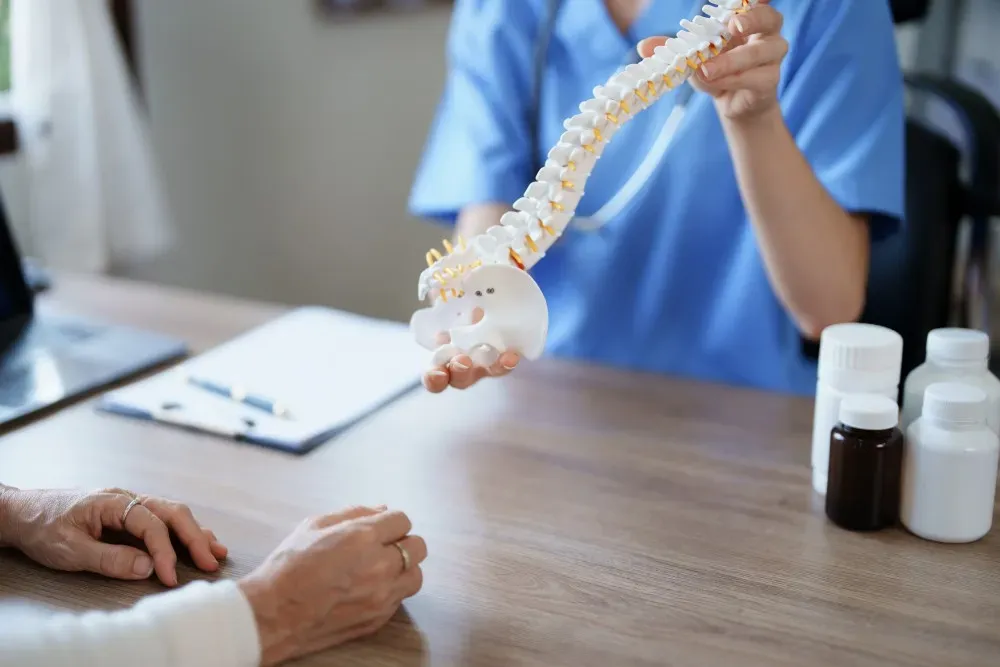Neurosurgery & Orthopedic Surgeons in Jacksonville

Will a Pinched Spinal Nerve Resolve on Its Own?
A pinched spinal nerve could eventually resolve on its own. However, are you sure you want to wait that long? Many conservative therapies offer relief from the pain and other symptoms related to irritated or inflamed spinal nerves.
Our mission at Integrity Spine & Orthopedics in Jacksonville, Florida is to offer the most effective treatments for relieving discomfort and restoring mobility. In most cases, pinched spinal nerves respond to conservative therapies like rest and physical therapy.
However, because the underlying causes of a compressed spinal nerve can vary from poor posture to severe and progressive degenerative changes in the spine, it’s essential to identify the reason for your pain before settling on a treatment strategy.
Here’s more from our team about the causes and therapies available for pinched nerves:
What is a pinched nerve?
Pinched nerves occur when pressure is applied to a nerve by surrounding bones, cartilage, muscles, or tendons, resulting in nerve irritation and inflammation. This can cause pain, numbness, or weakness in areas served by the nerve.
A pinched nerve in the spine, also known as radiculopathy, is usually caused by pressure on a nerve as it exits the spinal column. Symptoms related to radiculopathy can vary depending on which nerve is affected.
For instance, a compressed or pinched nerve in the lumbar (lower) spine can cause symptoms in the hips, buttocks, and backs of the legs. This is commonly known as sciatica.
Otherwise, symptoms related to a pinched spinal nerve include:
- Sharp, shooting, or electric-shock-type pain traveling into the legs, arms, neck, or head
- Muscle weakness in the affected extremities
- Numbness in the legs or arms
- Problems with balance
- Loss of bowel or bladder control
- Back pain that may worsen with certain activities, including coughing or sneezing
- Pins-and-needles sensation in the affected areas
Many issues that cause pinched nerves are temporary and often respond well to conservative therapies. However, because some conditions are progressive and can result in permanent nerve damage, it’s essential to identify the underlying cause.
What causes pinched nerves in the spine?
Conditions that may lead to radiculopathy include:
- Herniated or bulging disc
- Spinal stenosis (narrowing of the spinal canal)
- Rheumatoid arthritis
- Osteoarthritis (wear-and-tear or age-related arthritis)
- Bone spurs
- Facet joint syndrome
- Traumatic injury
- Osteoporosis (decreased bone density)
- Vertebral compression fracture (related to osteoporosis)
- Degenerative disc disease
- Age-related stiffening of the spinal ligaments
Spinal misalignment related to poor posture or muscle strain can also result in nerve compression.
How do you treat a pinched nerve?
Treatment at Integrity Spine & Orthopedics starts with a physical evaluation and careful review of your symptoms. Depending on those results, you may also benefit from X-rays or other imaging studies to clarify the level and type of damage.
A pinched nerve can improve with rest, gentle stretching, and anti-inflammatory medication. If inflammation and pain are significant, a steroid injection can help. However, you may require further treatment if the pinched nerve is caused by a more serious condition, such as a herniated disc, spinal stenosis, or degenerative disc disease.
Surgery is always our final consideration at Integrity Spine & Orthopedics. However, an operation may be your best option if your pain and other symptoms aren’t responding to conservative treatments.
Fortunately, most spine surgeries these days are minimally invasive, offering reduced tissue trauma, fast pain relief, and a quicker recovery than open or traditional surgery.
Schedule an evaluation at Integrity Spine & Orthopedics today. Call the office or request an appointment online.




